When books go missing…
In 1456 the Faculty of Arts at the University recorded a decision to install library furniture ‘in a small room at the end of the big school’, and acknowledged gifts of books from two donors to begin the library. The first book listed was donated to the library by Alan Cant, Chancellor of St Andrews and Dean of Chapel Royal. The book was promptly borrowed by John Athilmer, Provost of St. Salvator’s College on the 3 October 1457 (Faculty of Arts Minutes UYUY411/1) with the promise to return it to the Dean of the Faculty, but the book was, sadly, never to be seen in the library again…
So starts the history of the University’s management of library collections. In a previous blog about the history of the King James Library, colleagues have referred to the ‘struggle played out between order and chaos’ in working libraries. As we approach the end of term, when there will be a return of library books no longer needed, we thought we would take a look at how previous librarians have kept track of books through the years.
The post of Librarian (bibliothecarius) was first established in St Andrews by the Acts of Commission for Visitation in 1642. The first Librarian appointed was John Govan (UYSS110/AG/2d). The earliest extant catalogue in the archive, or rather a list of books, is dated from not long after this visitation in 1644 (UYLY105/1).
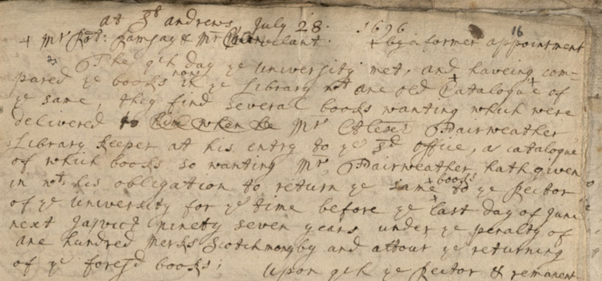
Some of the earliest surviving minutes of Senatus from later 17th century onward report various surveys of the Library, both its fabric and the state of the books. A review of the books was undertaken in 1696 by comparing the books in the library with those in an old catalogue, but it is reported to Senatus that several books are wanting from the library which ‘were delivered to Mr Alex[ander] Fairweather Library Keeper at his entry to the [th]e s[aid] office’. Fairweather had listed the missing books and was to return them or pay the fine of 100 merks Scotch money.
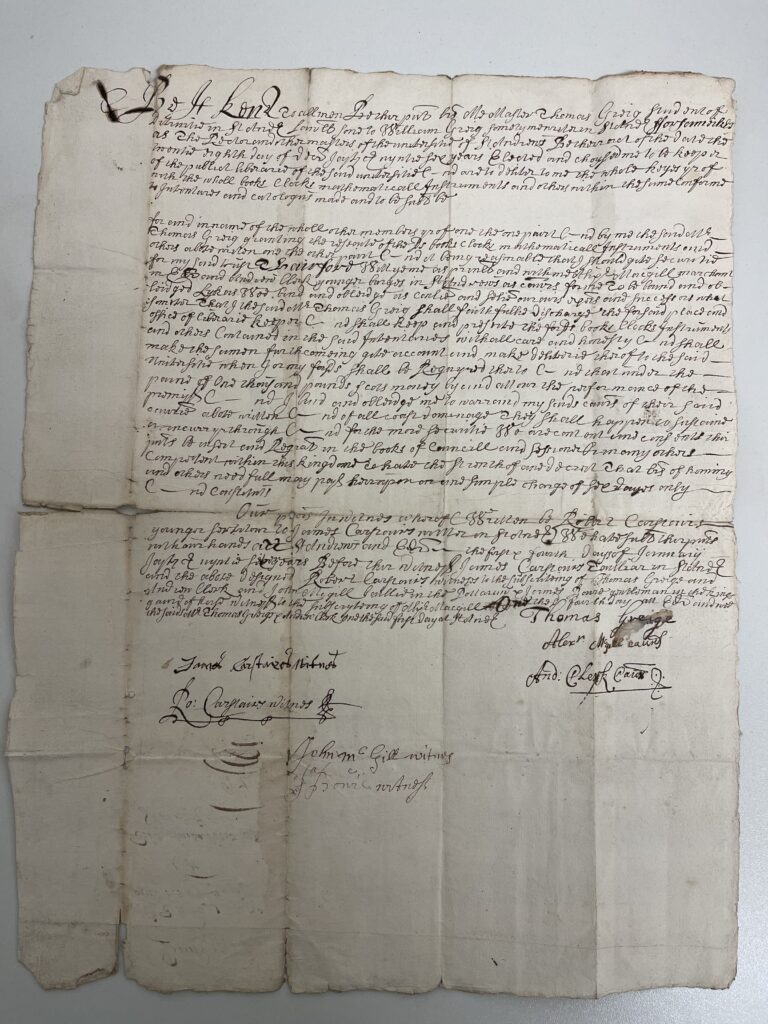
Even into the 18th century University librarians had to sign a bond of caution upon taking up their post promising to ‘keep and preserve the forsaids books, clocks and instruments […] with all honesty and care’. Thomas Greig upon taking up his post as Librarian in 1696 signed a bond worth 1000 pounds Scots. It is perhaps unsurprising that some of the Librarians, such as William Vilant (d. 1788), were disliked by students for their unwillingness to lend books. The Library regulations of 1734 in fact state that the Library Keeper’s salary could be cut for failure to ensure books are returned:
10th February 1734
That if the Civis [student] neglects to return the books he has borrowed against the time limited, or to renew his receipt as appointed, he shall every week he is thus negligent forfeit six pence sterling for each book he has borrowed, to be exacted by the Library Keeper and put in the Library Quaestor’s hands; and if it shall happen that any Civis continues this negligent for six weeks together beyond the time limited, the Library Keeper shall in this event go and demand the books and forfeiture, and if he fails, either in recovering the books or in levying the forfeiture, he shall upon the first occasion lay the matter before the University, otherwise he himself shall be found lyable, both for the value of the books and the forfeiture, which shall be retained off his yearly salary.
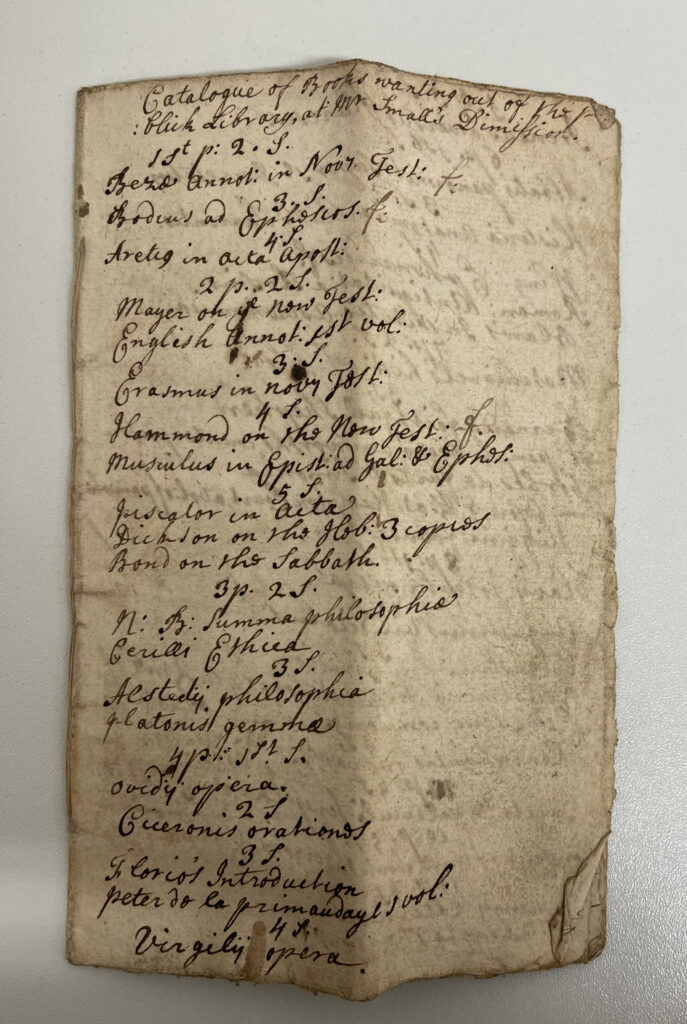
The Library archive contains a number of lists of books missing from the presses, such as the above from the time of Librarian Mr Small, c.1718-1720. The Regulations of 1734 state that there was to be annual inspection of the books:
10th February 1734
That the University shall pass an act appointing that annually against the 1st Munday of May all the books belonging to the Library shall be return’d, brought in to the Library, and put in their proper places; … if any Civis shall fail in returning the books as required he shall forfeit his privileges in the Library.
A regular report of the Curators for the Library, a post separate to the Librarian, was submitted to Senatus, listing books found wanting or out to readers. In July 1752, 17 books were out at the time of inspection and 25 were missing.
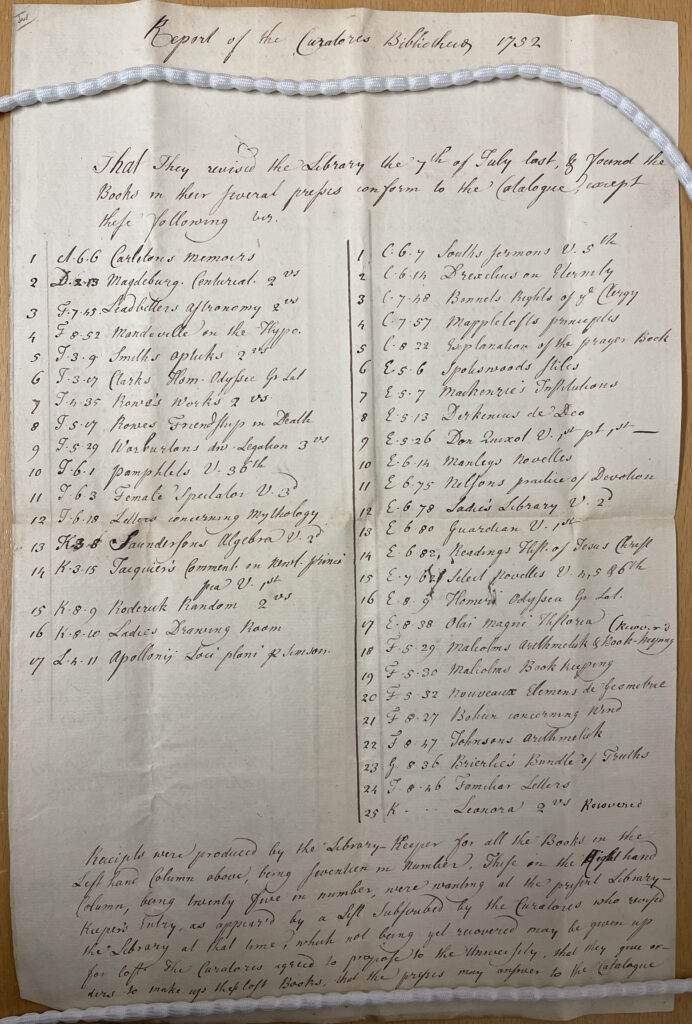
Advertisements would be put up to remind Library users that the books had to be returned. Upon the death of the Librarian Vilant in 1788:
The Rector […] ordered an advertisement to be affixed on the gates of each College ordering the students of both Colleges to deliver into the Publick Library all the books belonging to it that are at present in their possession.
It was very typical for a recall to be issued on the death of a librarian, and for the books to be checked so that his bond or his guarantors, could be used to pay for any missing items. At that point also the Library receipt books are ruled off and outstanding loans are carried forward into a new register. The return of books for an annual inspection continued in April or May as a regular part of the academic year. A review of the regulations by Senatus suggested a review at the end of each session.
23 March 1839
The meeting took under consideration the regulations regarding the management of the library when the following were adopted, and ordered to printed.
That they shall review the library annually at the close of each session, and take care that such books as are reported list or missing shall be restored to the Library.
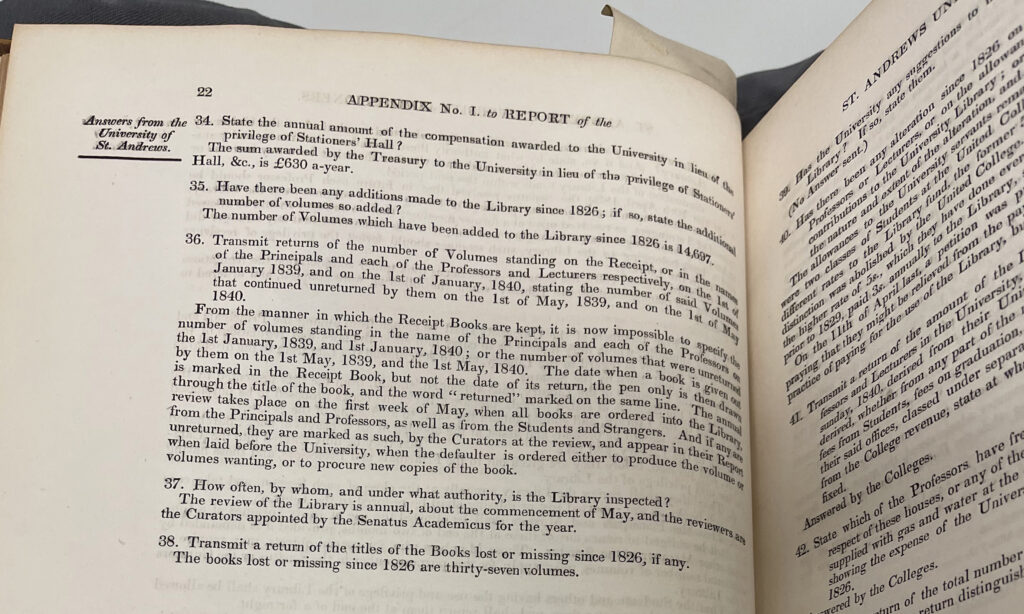
By the time of the University Commission of 1840, there was still an annual inspection in May.
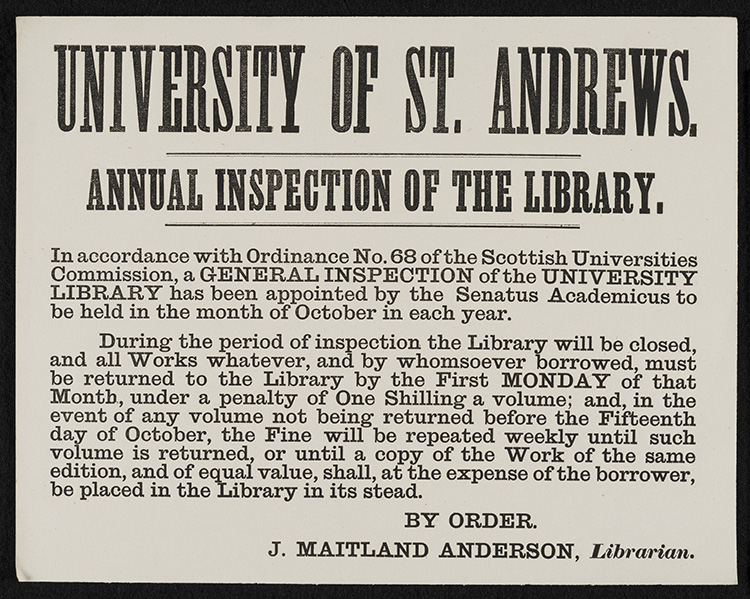
After the University Commissions Ordinance in 1862, the review moved to October.
The most satisfying outcome of reviewing the library is finding books that were thought lost. A note from 1827 reports that one of the books lost in 1796 had been found, The Memoirs of an English Officer which is still in the Library today in the rare book collections.
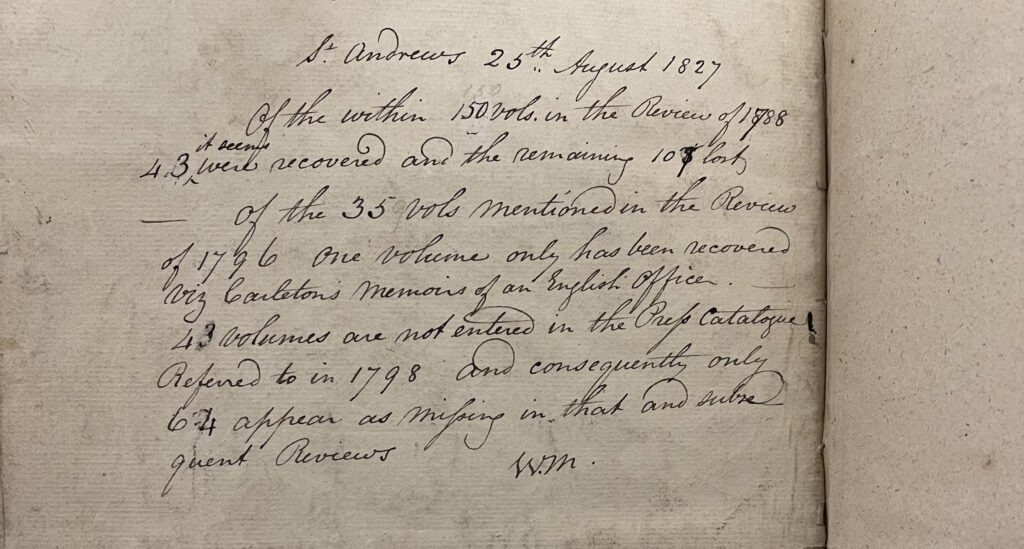
It was reported to Senatus on the 13th July 1833 that:
Dr Haldane gave into the Library Vorstius de Hebraismis, a book which had been sold among the late Professors Baird’s books, and which he had recovered and had paid for it 7/6 which sum he was to endeavour to recover from Mr Baird’s Executors.
Professor Archibald Baird had borrowed the book in November 1831 but sadly had not returned it. The book was returned to the library and can be found in University Collections.
This was not the last book to be found in a Professor’s library. University Librarian, James Maitland Anderson, included lists of recovered missing books in his regular Library reports, published in the Library Bulletin between 1901 and 1925. We see further examples of missing books returning to the Library in the Library Report of 1919.
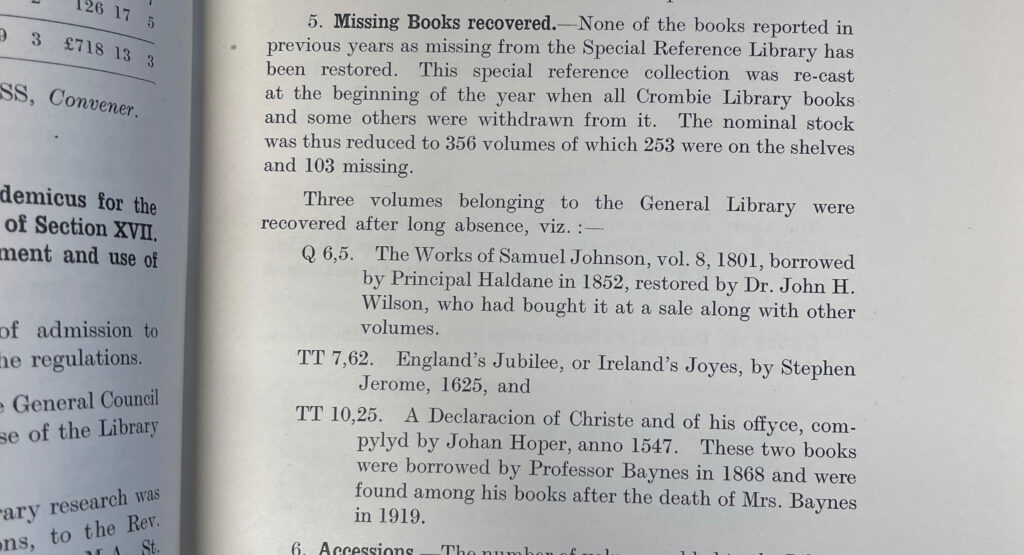
Three volumes are recovered, all having been borrowed in the 1860s by Professors.
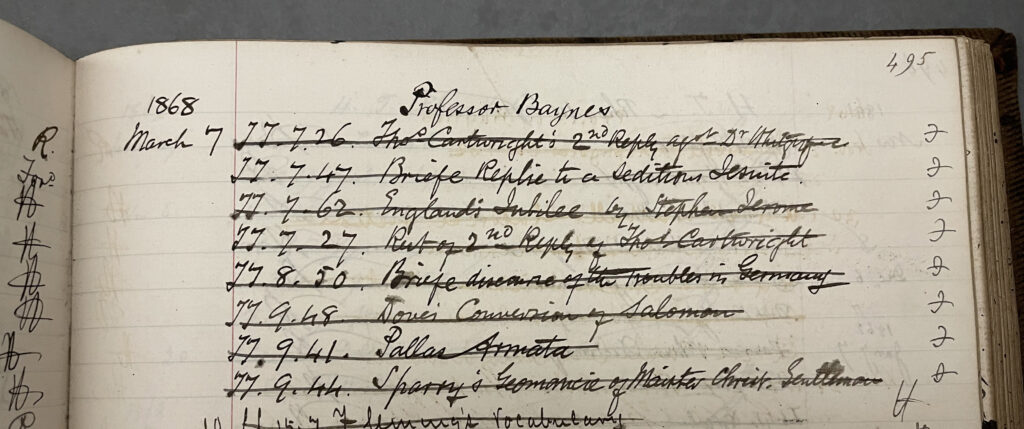
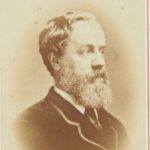
Professor Thomas Baynes, professor of logic, rhetoric and metaphysics (1864-1887) borrowed England’s Jubilee on the 7 March 1868. It was found 51 years later in 1919 when Library staff were reviewing his library for potential acquisitions to the Library (see ms37508 for catalogue of the Baynes Library).
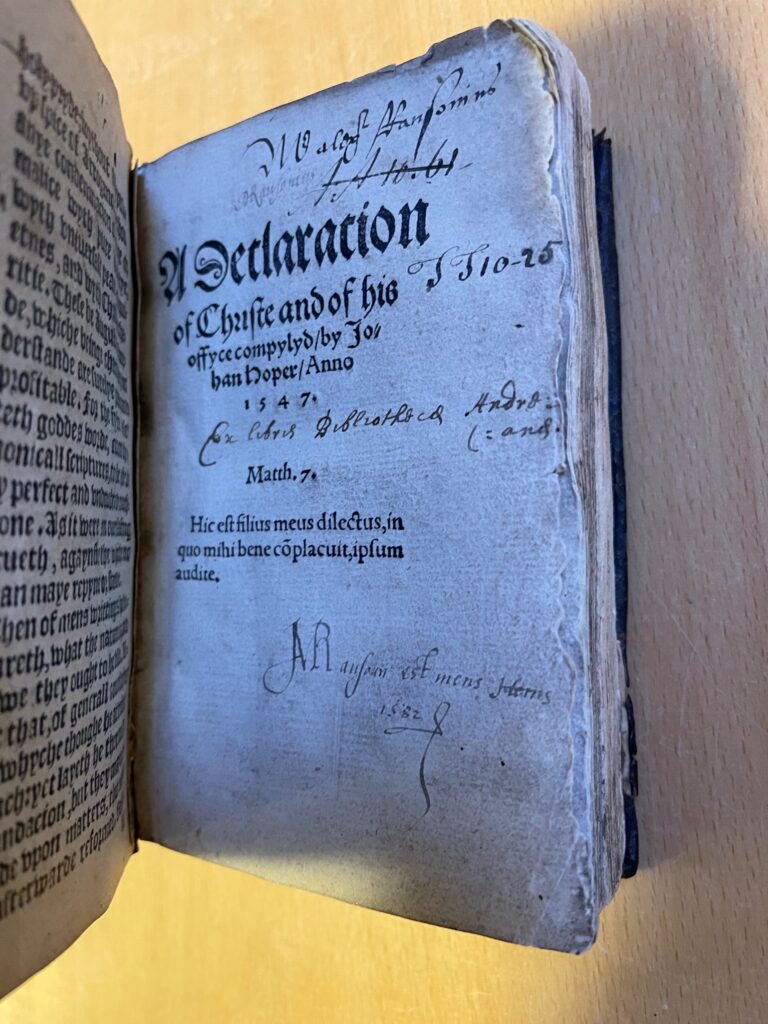
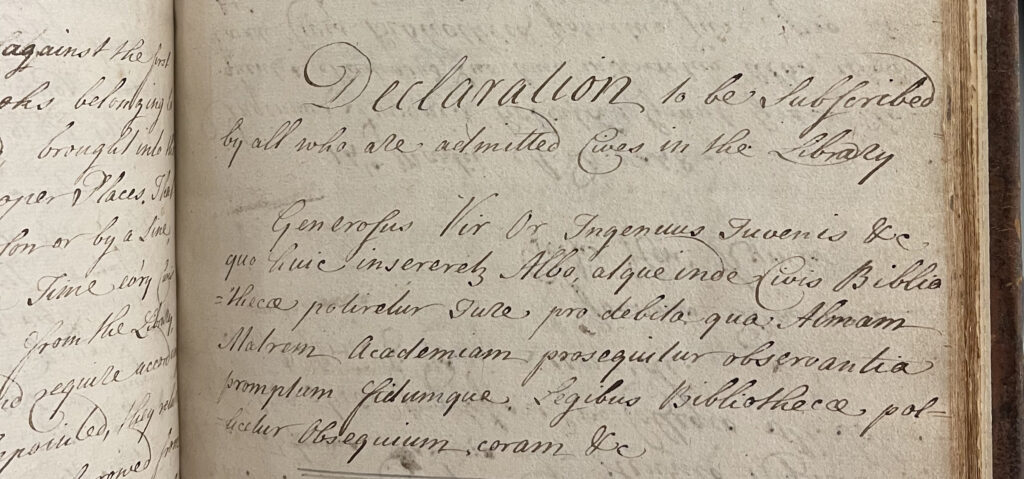
The first register of readers is dated from 1697 (Album bibliothecae civium UYLY201/1-2) and includes a list of the library regulations and the oath to which Civis had to sign promising to abide by the Library regulations.
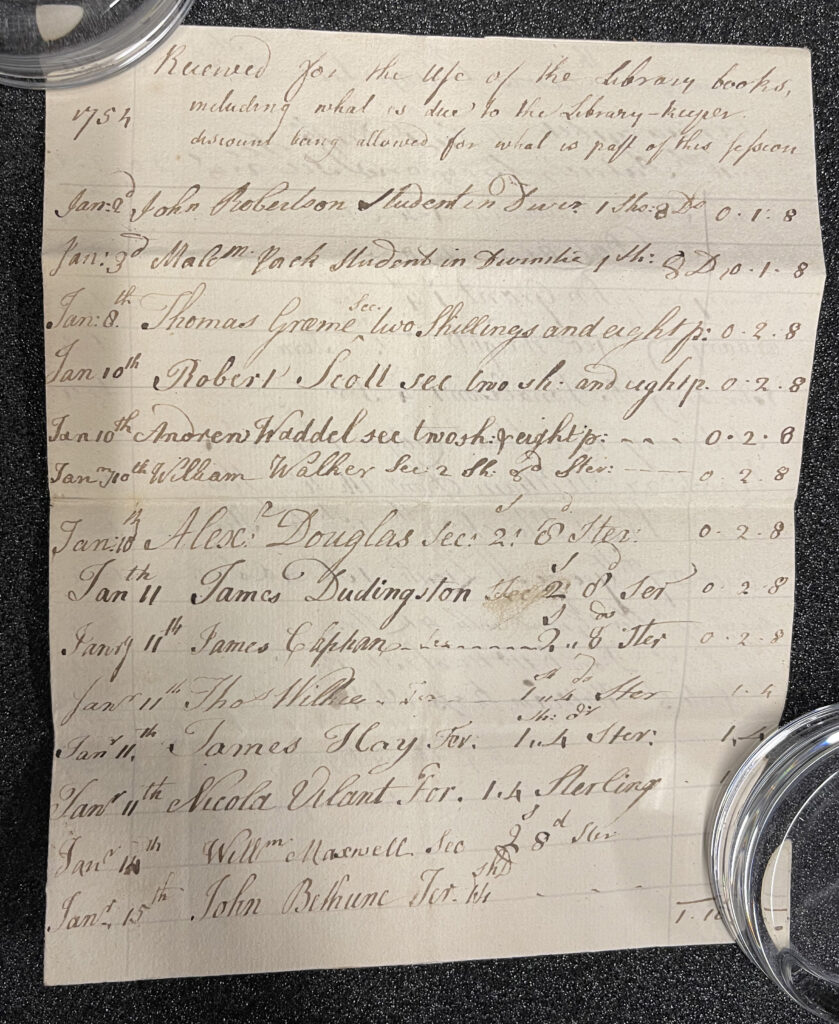
Fees were paid by students to enable them to use the Library. We can see the payments being made to Alexander Fairweather, Librarian by graduates of both colleges in 1692.
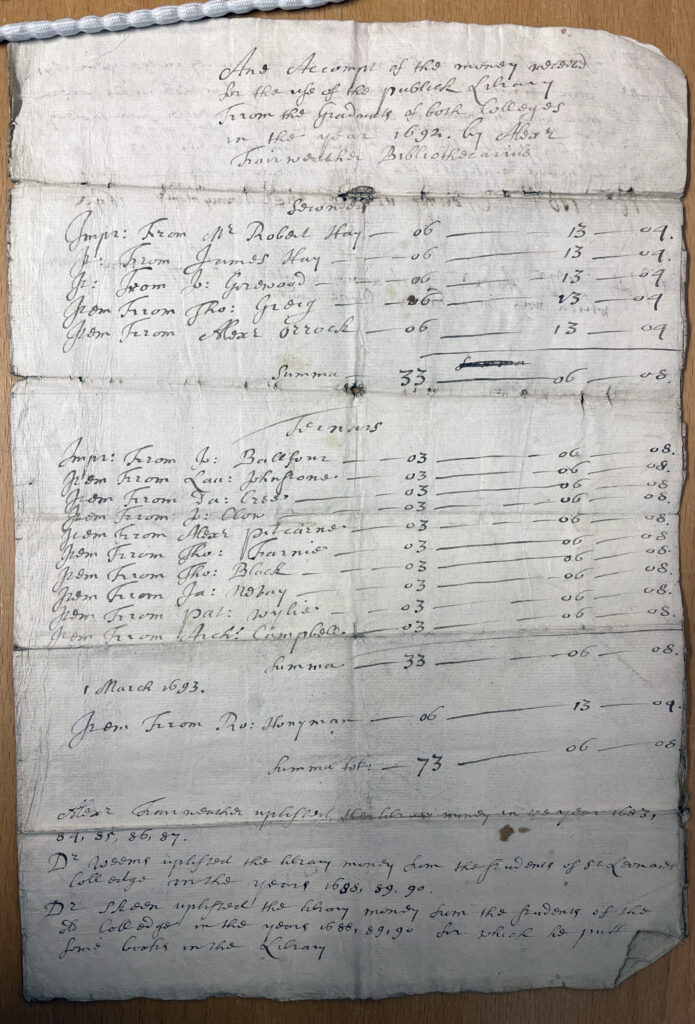
We have several library fine tickets in the archive, such as this one from 1697 in which the student Alexander Anderson received an extension as he was unable to pay the fine on time.
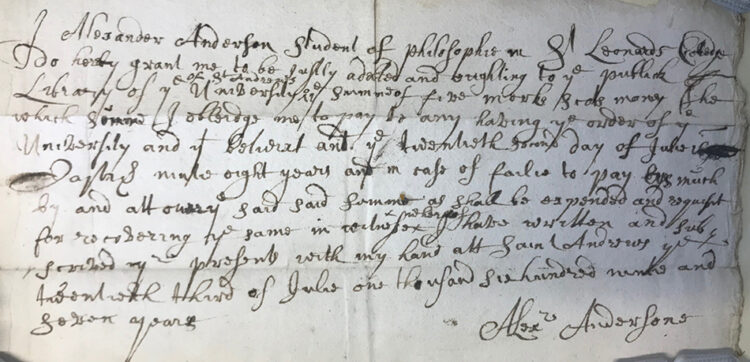
The fine for overdue books in 1734 was six pence per book. The Library regulations of 1863, state that the fine was to be three pence a day, and after receiving a printed notice to return the books, six pence a day.
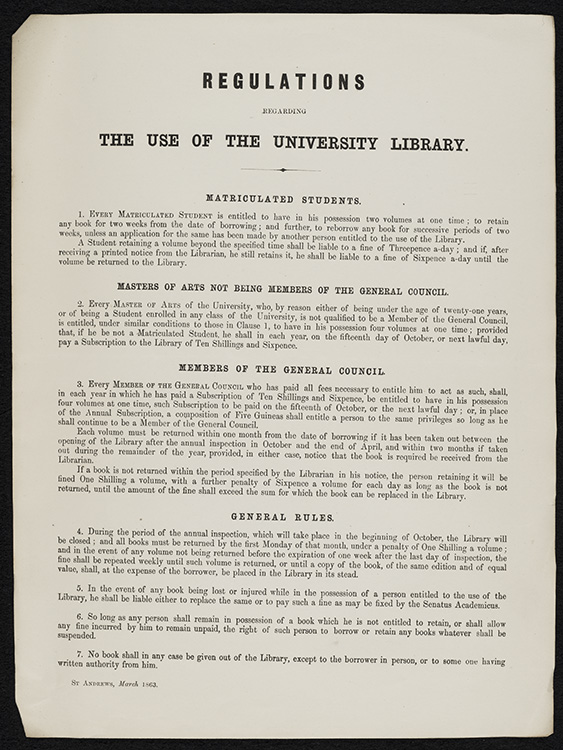
In 1841 students petitioned to have the £1 library deposit abolished. Their petition was granted, however they had to receive a voucher from the Librarian stating that they had returned their books before they could receive a certificate of class attendance from the Professor.
20 November 1841
A petition was laid on the table from the students of United College, paying to be freed from the payment of £1 as a deposit to the library, to ensure the books belonging to it from injury, which was agreed to.
The meeting resolve that no student shall be entered to receive a certificate from his Professor for attendance till he has submitted to the Professor a voucher from the Librarian that he has returned the books he has had from the Library in good order.
Until very recently it was not permitted for a student to graduate until they had paid off their library fines.
There is no longer an annual return of all books, as the University Library of today manages its collections with collections management software. It also no longer imposes fines on overdue books, though there are still fines for overdue recalled books or damaged books. We also encourage all students to return their books before graduation!
We hope to share more of the Library’s history from the Library archive in future blogs.